Daily Vocabulary Words: List of Daily Used Words in Leading Indian Newspapers
Hi there. Welcome to this special section @ Wordpandit. Our endeavour here is straightforward: highlighting daily vocabulary words that you would come across in leading newspapers in the country. We have included the following newspapers in our selection:
• The Times of India
• The Economic Times
• Hindustan Times
• Mint
• Indian Express
We are putting in extensive work to develop your vocabulary. All you have to do is be regular with this section and check out this post daily. This is your repository of commonly used words; essentially, we are posting a list of daily used words. Hence, this has significant practical application as it teaches you words that are commonly used in leading publications mentioned above.
Visit the website daily to learn words from leading Indian newspapers.
WORD-1: Clawed
CONTEXT: Zomato has gained market share in quick commerce, partly due to the weakness of a main competitor and partly because it has clawed market share from unorganised retail in small towns.
SOURCE: Live Mint
EXPLANATORY PARAGRAPH: Imagine a cat stretching out its paws and showing its sharp nails to grab onto a toy or climb a tree. That’s what “clawed” means. It’s like having sharp nails or claws that animals use to hold onto things, scratch, or climb.
MEANING: Having claws or sharp nails used for grabbing or scratching (adjective).
PRONUNCIATION: KLAWD
SYNONYMS: Taloned, Nailed, Scratchy, Hooked, Grippy, Sharp-nailed
USAGE EXAMPLES:
– The clawed creature climbed the tree effortlessly.
– She adopted a clawed kitten from the shelter.
– His hands were as clawed as a bird of prey when he grabbed the branch.
– The clawed feet of the bird held onto the perch tightly.
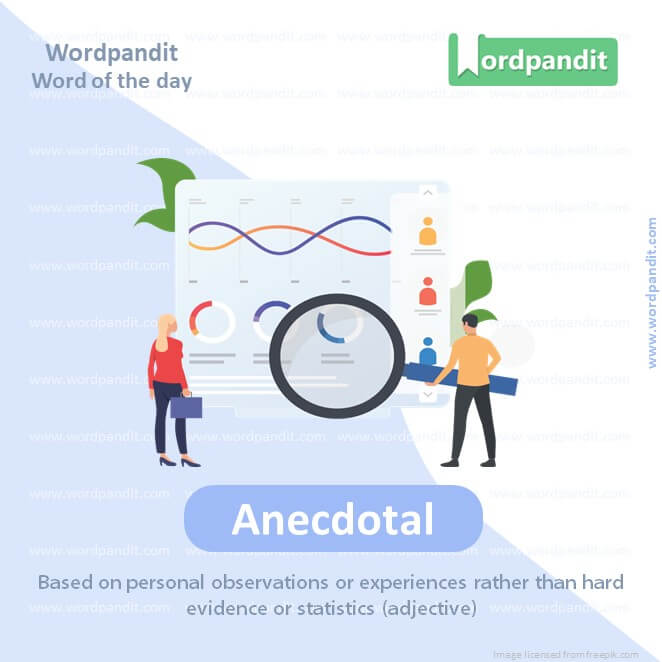
WORD-2: Anecdotal
CONTEXT: Excellent third-quarter results with high growth confirm anecdotal evidence about a consumption rebound in certain segments of the economy.
SOURCE: Live Mint
EXPLANATORY PARAGRAPH: Imagine you’re listening to your grandparent tell a fun story about something that happened when they were young. It’s not a story from a book, but a personal story about their own life. That’s what “anecdotal” means – it’s like sharing little, personal stories or experiences that might not be proven or true for everyone.
MEANING: Based on personal observations or experiences rather than hard evidence or statistics (adjective).
PRONUNCIATION: an-ik-DOH-tuhl
SYNONYMS: Storytelling, Unscientific, Informal, Subjective, Personal, Narrative
USAGE EXAMPLES:
– The doctor’s advice was based on anecdotal evidence.
– He shared an anecdotal story that made everyone laugh.
– Anecdotal reports suggest the treatment might be effective.
– Despite the anecdotal success, further research is needed.
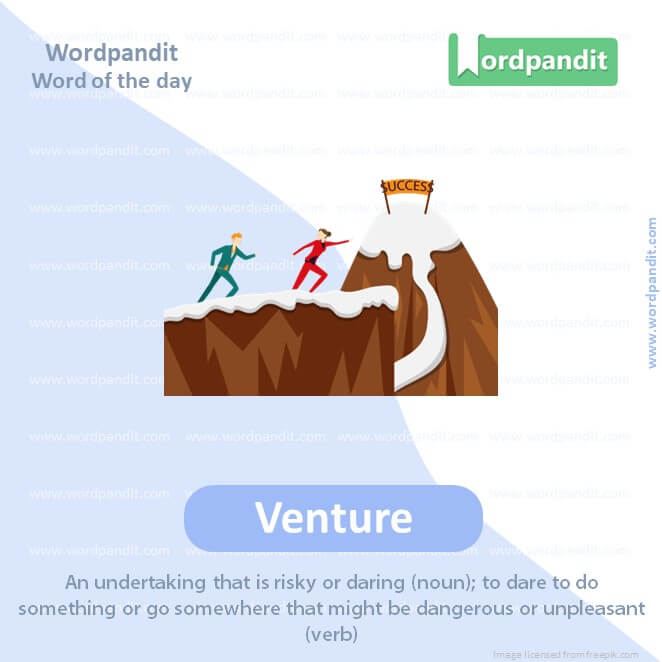
WORD-3: Venture
CONTEXT: In addition, the cash stash (money raised from Zomato’s IPO and its venture capital funding that has not yet been invested) earns over ₹200 crore in revenue per quarter, so treasury operations are also important.
SOURCE: Live Mint
EXPLANATORY PARAGRAPH: Imagine you decide to build a lemonade stand in front of your house to sell lemonade. You’re trying something new that you hope will be fun and maybe make some money. That’s like a “venture” – it’s when someone starts a new project or business, hoping it will be successful, even if there’s a chance it might not work out.
MEANING: An undertaking that is risky or daring (noun); to dare to do something or go somewhere that might be dangerous or unpleasant (verb).
PRONUNCIATION: VEN-cher
SYNONYMS: Enterprise, Undertaking, Project, Endeavor, Operation, Expedition
USAGE EXAMPLES:
– She started her own venture in the tech industry.
– The joint venture between the two companies was a success.
– They were cautious about investing in a new venture.
– His latest venture into the restaurant business proved challenging.
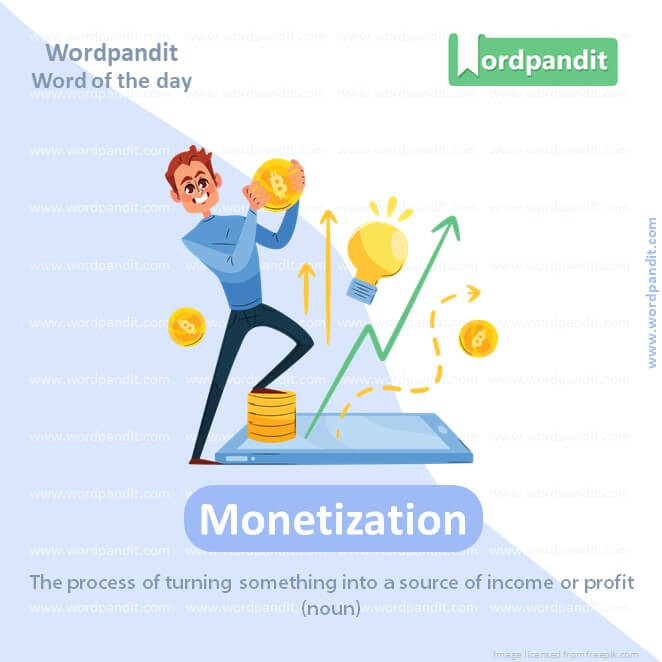
WORD-4: Monetization
CONTEXT: Zomato’s turnaround is driven by better ad-monetization, the calculated hiking of platform fees, and better cost efficiencies.
SOURCE: Live Mint
EXPLANATORY PARAGRAPH: Imagine you draw a beautiful picture and decide to sell copies of it to your friends and family. By selling your artwork, you’re making money from something you created. That’s what “monetization” means – finding a way to make money from something, like selling products, services, or using ads.
MEANING: The process of turning something into a source of income or profit (noun).
PRONUNCIATION: mon-i-tuh-ZAY-shun
SYNONYMS: Commercialization, Capitalization, Profit-making, Revenue generation, financial exploitation
USAGE EXAMPLES:
– The monetization of the website came through advertisements and subscriptions.
– They discussed various strategies for the monetization of their app.
– The artist found success in the monetization of her online content.
– Monetization of the blog was achieved through sponsored posts.
WORD-5: Dogging
CONTEXT: The survey finds that young women are much more likely to doom spend than their mothers and older sisters. Throw in the financial precarity dogging millennials and Gen Z—the New York Fed noted that rising credit card and auto loan delinquencies were especially pronounced among younger borrowers—and you have a recipe for misery.
SOURCE: Live Mint
EXPLANATORY PARAGRAPH:Imagine you’re playing tag, and no matter where you go, one friend keeps following you, trying to tag you. It’s like they won’t leave you alone and are always right behind you. That’s what “dogging” means – persistently following or bothering someone, just like your friend who keeps trying to tag you.
MEANING: Persistently following or bothering (verb, gerund or present participle).
PRONUNCIATION: DAWG-ing
SYNONYMS: Harassing, Pursuing, Hounding, Stalking, Chasing, Badgering
USAGE EXAMPLES:
– The issue has been dogging him for years.
– She found herself dogging the celebrity for an autograph.
– The team was dogging the leading players to gain an advantage.
– Questions about his past kept dogging him during the interview.
WORD-6: Precarity
CONTEXT: The survey finds that young women are much more likely to doom spend than their mothers and older sisters. Throw in the financial precarity dogging millennials and Gen Z—the New York Fed noted that rising credit card and auto loan delinquencies were especially pronounced among younger borrowers—and you have a recipe for misery.
SOURCE: Live Mint
EXPLANATORY PARAGRAPH: Imagine you’re walking on a narrow beam, and it feels like you could fall off at any moment. You’re not sure if you can keep your balance. That’s what “precarity” is like – it’s when someone’s situation is very uncertain or unstable, and they feel like anything could happen, making them feel unsafe or worried.
MEANING: The state of being insecure, unstable,or uncertain, especially in terms of employment, living conditions, or future prospects (noun).
PRONUNCIATION: pre-KAIR-i-tee
SYNONYMS: Instability, Uncertainty, Insecurity, Riskiness, Unpredictability, Vulnerability
USAGE EXAMPLES:
– Many workers face precarity in the gig economy.
– The precarity of his financial situation worried him.
– Policies aim to reduce the precarity of temporary employment.
– The documentary highlighted the precarity of living in conflict zones.
WORD-7: Misery
CONTEXT: The survey finds that young women are much more likely to doom spend than their mothers and older sisters. Throw in the financial precarity dogging millennials and Gen Z—the New York Fed noted that rising credit card and auto loan delinquencies were especially pronounced among younger borrowers—and you have a recipe for misery.
SOURCE: Live Mint
EXPLANATORY PARAGRAPH: Imagine you lost your favorite toy, and you feel really sad and upset about it. You might not want to play or smile because you’re thinking about your toy. That feeling of being really sad and not happy is called “misery.” It’s when you feel very unhappy or are having a really tough time.
MEANING: A state of great distress or discomfort of mind or body (noun).
PRONUNCIATION: MIZ-er-ee
SYNONYMS: Suffering, Wretchedness, Despair, Anguish, Distress, Torment
USAGE EXAMPLES:
– The news of the disaster spread misery throughout the town.
– He expressed his misery over the loss of his job.
– The cold, wet weather added to their misery.
– The book describes the misery of life in the trenches.
WORD-8: Inherited
CONTEXT: The power of luxury goods comes from the way we constantly compare ourselves. It’s easy to forget that the couple posting enviable photos of their new home might not be able to afford it or that they may well have benefitted from inherited wealth.
SOURCE: Live Mint
EXPLANATORY PARAGRAPH: Imagine your grandparents give you a special toy that’s been in your family for many years. Now it’s yours to keep and play with. That toy was “inherited” by you, which means it was passed down to you from someone in your family after they thought you should have it, often because they care about you or it’s a family tradition.
MEANING: Received as an inheritance from someone, especially a family member, after they pass away or decide to give it to you (verb, past tense).
PRONUNCIATION: in-HER-it-ed
SYNONYMS: Bequeathed, Passed down, Transferred, Conveyed, Devolved, Willed
USAGE EXAMPLES:
– She inherited her grandmother’s jewelry.
– The property was inherited by the eldest son.
– They inherited a love of music from their parents.
– The inherited house came with many responsibilities.
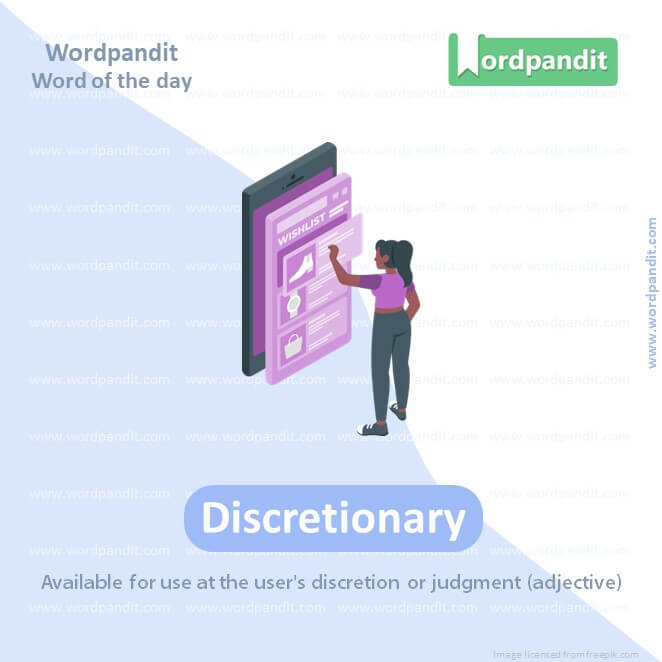
WORD-9: Discretionary
CONTEXT: Corporate marketing departments have long been aware of these psychological tricks and have chased after the female consumer, who controls the majority of household’s discretionary spending despite her lower earning power.
SOURCE: Live Mint
EXPLANATORY PARAGRAPH: Imagine you have a box of cookies, and it’s up to you to decide when and how many cookies to eat. You can choose to eat them all at once or save some for later. That choice is yours to make. That’s what “discretionary” means – having the freedom to decide what to do in a situation, like choosing when to eat your cookies.
MEANING: Available for use at the user’s discretion or judgment (adjective).
PRONUNCIATION: dis-KRE-shuh-nair-ee
SYNONYMS: Optional, Voluntary, Elective, Personal, Arbitrary, Subjective
USAGE EXAMPLES:
– The manager has discretionary authority over the budget.
– Discretionary spending on luxury items increased.
– They have a discretionary fund for unexpected expenses.
– The use of the bonus is entirely discretionary.
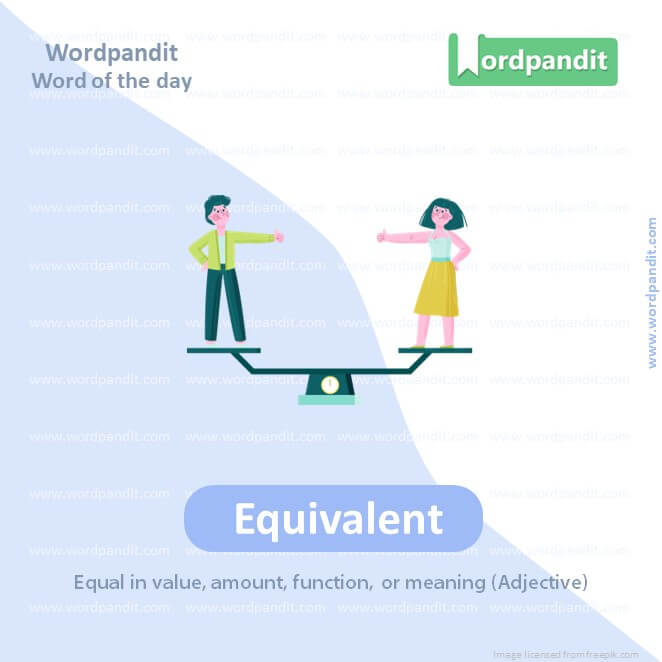
WORD-10: Equivalent
CONTEXT: The modern equivalent would be algorithm-targeted ads selling teas, acupressure mats and subscription supplements as ‘self-care.’
SOURCE: Live Mint
EXPLANATORY PARAGRAPH: Imagine you have two boxes of crayons. One box has 8 big crayons, and the other box has 16 small crayons. Even though the boxes have different numbers and sizes of crayons, they can color the same amount of pictures. That means they’re “equivalent” – they’re different but can do the same thing or have the same value.
MEANING: Equal in value, amount. function, or meaning (Adjective).
PRONUNCIATION: ih-KWIV-uh-lent
SYNONYMS: Equal, Comparable, Identical, Corresponding, Similar, Coequal
USAGE EXAMPLES:
– The two studies are roughly equivalent in terms of their findings.
– A kilometer is equivalent to approximately 0.62 miles.
– The responsibilities of the job are equivalent to those of a manager.
– He offered an apology, which she accepted as equivalent to an admission of guilt.
Vocabulary
Language is a confluence of thoughts, emotions, and experiences that find vibrant expression through words. In this spectrum, ‘vocabulary’ shines as a critical aspect that shapes and directs our language proficiency. It offers depth, nuance, and clarity to our expressions. However, mastering ‘vocabulary’ is an art that requires a strategized approach.
An intensive strategy for learning ‘vocabulary’ goes beyond the limiting precincts of memorization. Instead, it nudges learners towards comprehension and application. To understand ‘vocabulary’, take a step forward from traditional textbooks and classroom sessions, and embrace the vast world of books, articles, podcasts or digital content in the language you are learning. This step allows you to understand words in context, see how they are used in different situations, and absorb words as part of the natural flow of language.
As you journey through ‘vocabulary’, remember that this expedition should not be a race. Rather, it’s a marathon where pacing yourself is pivotal to long-term success. Learning a few words each day and consolidating your knowledge through regular revision tends to be more effective, as it prevents cognitive overload and promotes solid retention.
Interactive learning tools can provide valuable support in assimilating ‘vocabulary’. Use of flashcards, language-learning apps, or memory-enhancing software can make this process more engaging and effective, reinforcing the ‘vocabulary’ in your memory.
Lastly, practice is an incontrovertible part of mastering ‘vocabulary’. Utilize the learnt vocabulary in your daily conversations, write-ups, or presentations to ensure an active application. Doing this fosters recall and cements understanding.
In summation, learning ‘vocabulary’ is a journey that should be embraced with an integrated approach, where understanding and application are the key elements. By engaging with diverse learning resources, pacing the learning process, employing interactive learning tools, and practicing regularly, the journey of mastering ‘vocabulary’ becomes a fulfilling and enriching experience.













